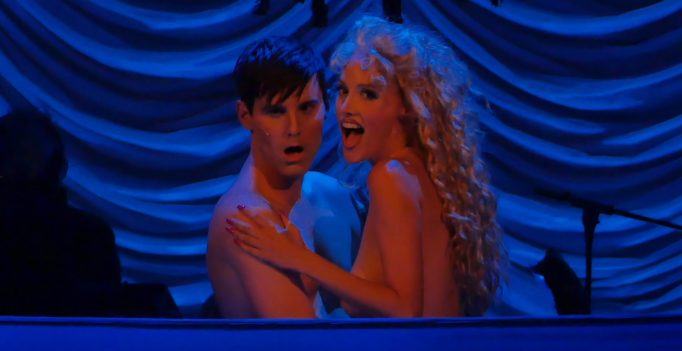Jeffrey McHale’s documentary You Don’t Nomi dissects 1995’s much maligned racy drama Showgirls in a similar way that Rodney Aster’s Room 237 delved into different theories on Stanley Kubrick’s adaptation of The Shining. Both films are about how cult interest breathed new life into a filmmaker’s original vision, however the difference between the documentaries stems from their points of interest. Room 237 was about how movie goers have interpreted visual totems within the film. You Don’t Nomi is about the various opinions on the overall finished project, and whether a film can coexist as a masterpiece and absolute trash.
You Don’t Nomi is structured as a visual essay – a range of assessments are audibly paired with video clips. But, the film isn’t only about Showgirls; it’s also about the eclectic career of its director Paul Verhoeven. This gives McHale the option to compare Showgirls against Verhoeven’s filmography which he does throughout the doc to a beneficial degree; highlighting recurring themes and motifs as well as literally splicing the documentary seamlessly into these other movies.
You Don’t Nomi is all about subjectivity – a thought-provoking study on personal opinions. Just as Room 237 showed us the possibilities of reading into details of set dressing, McHale gives a platform to those who admire or condemn Verhoeven’s filmmaking, those who praise or slam Elizabeth Berkley’s one-of-a-kind performance, and those who view the film in a positive or negative light. McHale finds a way to validate each opinion, even going as far as vindicating specific aspects of the movie because of this newfound, cultured appreciation for Showgirls. Berkley’s watershed period post-Showgirls, for instance, is chronicled extremely well in the documentary; showing the wide-eyed excitement of the actor persevere through rough criticism only to later be pardoned for giving a performance, some say, is heightened above the rest of the film.
The most divisive debate, however, discuses the film’s controversial portrayal of sexual violence and the empowering moments afterwards for Berkley’s character.. Just as he did with various interpretations of the film, McHale leaves this dicey discussion unresolved in order to be uniformly fair which is wise. We end up understanding the claims about how some find it offensive, but we also comprehend how the lead actor in the off-broadway hit Showgirls the Musical identifies the personal importance of those scenes.
However, to get a full experience of You Don’t Nomi, a rewatch of Showgirls is required. Without it, you can still enjoy Jeffrey McHale’s movie, but your connection may not be as strong. Assuming this was the case, I did revisit Showgirls, which solidified You Don’t Nomi as the definitive companion piece and one of my favourite double features in recent memory.
**********
Do You Tweet? Follow These Tweeple:
Addison Wylie: @AddisonWylie





Be the first to comment